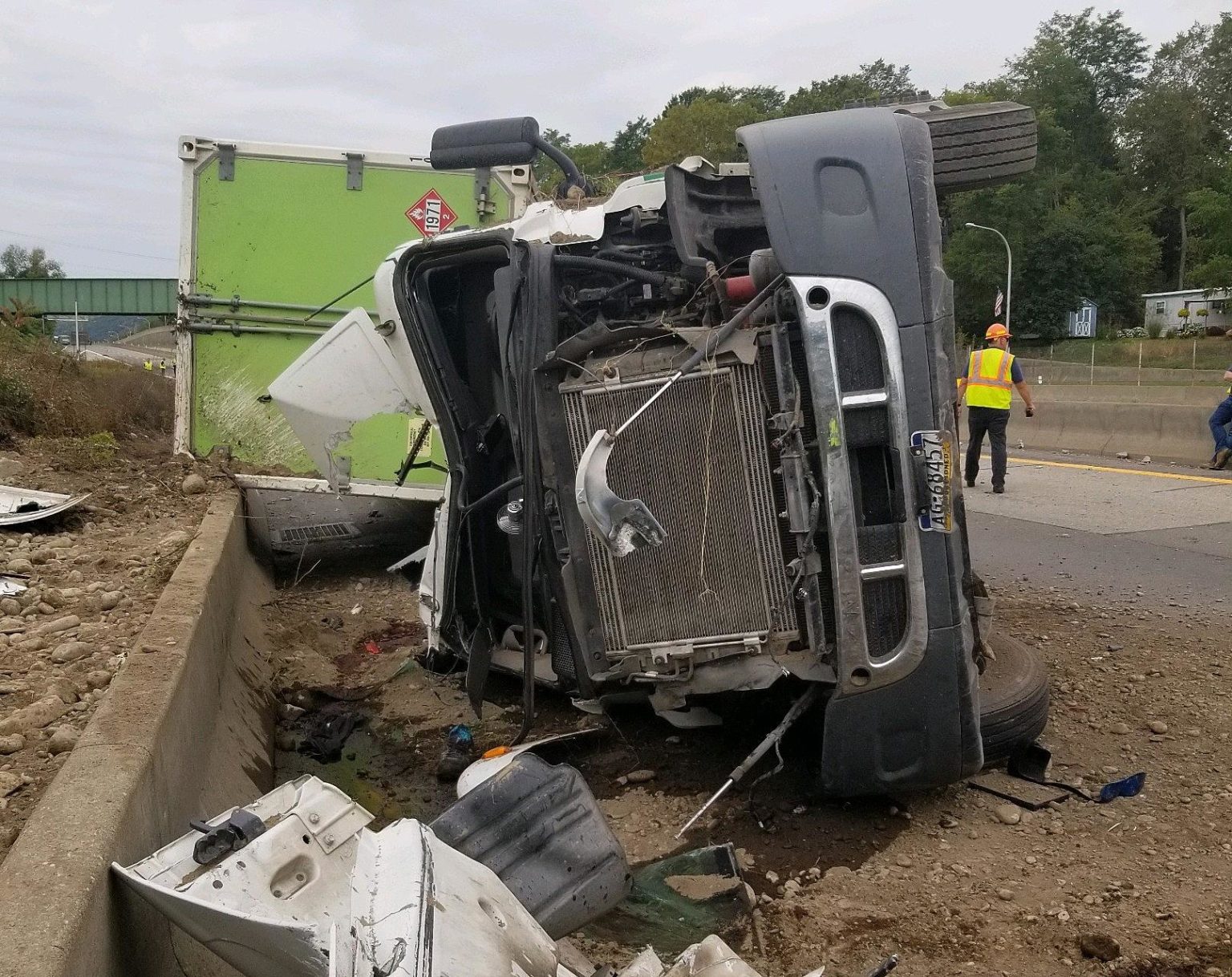On Monday around 1:00 a.m., a “Virtual Pipeline” truck carrying compressed natural gas mined from the Marcellus Shale crashed on Interstate 88 near Binghamton, New York, after the vehicle swerved to avoid deer, flipped over, and fatally ejected 52-year-old driver Jeffrey Lind. The truck’s container system began leaking compressed methane gas, a potent greenhouse gas, into the atmosphere. Governor Andrew Cuomo declared a state of emergency in Broome County, where the crash occurred.
About 80 nearby homes were evacuated, two separate school districts shut for the day, and an army of state officials deployed to the scene, including agents with the New York State Division of Homeland Security.
In a state where climate activism is surging, and students recently walked out of school to join marches estimated at 4 million worldwide, residents and environmental advocates are demanding to know why these virtual pipeline trucks are still allowed to drive on New York highways and local community roads, near homes, schools, and places of worship.
Furthermore, research done by retired New York Department of Transportation commercial vehicle inspector Ron Barton indicates the trucks may be operating unlawfully.
Here are two photos from that fatal tractor-trailer crash this morning pic.twitter.com/qisLGhvcWz
— Vince Briga (@VinceBrigaTV) September 23, 2019
“We call upon our state and federal transportation regulators to investigate how these trucks have secured hazmat permits,” said Nicole Dillingham, president of the central New York advocacy group Otsego 2000, and resident of a community affected by virtual pipeline trucks. “This is a serious concern which must be addressed by state and federal regulators. These trucks must be removed from our roads until their safety is fully tested and necessary precautions implemented. It is a new technology requiring new, appropriate regulation.”
Questionable Permits
Virtual pipeline trucks contain specially designed cylinders that are loaded with compressed natural gas. The trucks haul the gas between existing pipelines or to areas not connected to a natural gas distribution system, such as rural towns, and remote factories, universities, and hospitals.
XNG, the energy company responsible for Monday’s accident has had 11 crashes in New York in just the past two years, according to data with the Federal Motor Carrier Safety Administration. XNG has not replied to questions from DeSmog.
Earlier this year DeSmog highlighted a March crash near Cobleskill, New York, in which compressed gas had leaked from the demolished truck. DeSmog revealed that because in several crashes the compressed gas containers have ruptured, virtual pipeline trucks may be violating a Special Permit from the U.S. Pipeline and Hazardous Materials Safety Administration (PHMSA), and thereby operating unlawfully. The permit states the containers must have “demonstrated the … ability to protect the tubes from damage due to front, rear, or side impact, and rollover.”
But Barton, the whistle-blowing former New York vehicle inspector, says that in at least three instances in New York state alone, gas has leaked from the containers, meaning the containers were not appropriately “protected” during a crash.
A scantily regulated and increasingly popular new way to ship fracked natural gas in New York & New England, going almost completely under the radarhttps://t.co/L4qDVkYISI@ashleybraun @DeSmogBlog
— Justin Nobel (@JustinNobel) May 22, 2019
Two companies construct the unique carbon fiber compressed natural gas containers: California-based Quantum Fuel Systems LLC and Hexagon Lincoln LLC, out of Lincoln, Nebraska. Barton pointed out that carbon fiber is not authorized as a material for containers holding compressed natural gas under hazardous material regulations, but by obtaining the Special Permit from PHMSA these companies are able to legally manufacture these containers.
Barton questions the general wisdom of the Special Permit, and is now calling for its outright revocation and an immediate investigation. “If operators don’t meet that Special Permit the permit should be yanked,” he said. “These trucks should not be allowed on the road.”
But that has not happened. Instead, at least to date, PHMSA has continued to allow the trucks to operate. “A PHMSA investigator reported to the scene of the accident on Monday [and] we will review information gathered to determine if any additional actions will be necessary,” an agency spokesperson told DeSmog. “PHMSA continuously reviews special permits and regulations to ensure the safe transportation of hazardous materials.”
Still Waiting for Government Action
Furthermore, despite an extensive effort by Barton and other local residents to inform officials of the hazard, New York leaders have done nothing to halt the trucks. “What I am really upset about is Delgado’s office,” said Barton, referring to the freshman Democratic congressman representing New York’s 19th congressional district, which includes Barton’s home.
Compressed Natural Gas
— Jason Garnar (@jasongarnar) September 23, 2019
Rep. Antonio Delgado’s district also encompasses a controversial XNG virtual pipeline route across central New York. This virtual pipeline is located in the same region where the Constitution pipeline, which faced a surge of activism and was denied a key permit by the New York State Department of Environmental Conservation in 2016, would have run. The route goes from the gas-rich Marcellus shale fields of Susquehanna County, Pennsylvania, to an interstate pipeline in north-central New York called the Iroquois.
Neither Congressman Delgado’s office nor Governor Cuomo’s office have replied to DeSmog questions on virtual pipeline trucks.
“I have informed Delgado’s office numerous times on the issue, and I don’t think Delgado has done anything with this,” said Barton. “I got to tell you, I have waited long enough, these trucks should have been off the road long ago.”
Virtual Pipelines: Growing, Along With the Protests Against Them
Instead, the industry seems to be going in the other direction. In early September, just two weeks before the Binghamton crash, Quantum Fuel Systems announced a new line of virtual pipeline trucks. “The new 40-foot Virtual Pipeline trailer comes standard with 45 tanks, has a gaseous capacity of approximately 471,000 standard cubic feet and weighs less than 57,000 pounds fully loaded,” reads a press release posted on Yahoo Finance. “Available in Q1, 2020, the VPLite45/40′ will be certified for use in the U.S. and Canada, with worldwide availability to follow.”
Meanwhile, in New York, the climate action groups 350.org, Sane Energy, Mothers Out Front, and others are already plotting a rally called Earth to Cuomo scheduled for October 13 in Poughkeepsie to protest Governor Cuomo’s inaction on virtual pipeline trucks, and other issues related to fracking.
Earth to Cuomo: The Rally for #NewYork‘s Climatehttps://t.co/6AWhf57Ijh#NY pic.twitter.com/c4BdDatHPW
— NEWomenforJustice (@NEWomen4Justice) September 21, 2019
“This horrific incident highlights why we demand an end to fracked gas transport in New York State,” said Kim Fraczek, director of Sane Energy. “Governor Cuomo and his Public Service Commission [PSC] must act now, and we will continue to raise the volume on the PSC. They must put the health and safety of the public first, rather than pander to an industry built on destruction and bullying that locks us into decades of more fossil fuels.”
“It’s unfortunate,” added Bill Kish, a co-organizer for the Earth to Cuomo rally. “Many New Yorkers are unaware that there is a substantial and thriving fracked gas industry crisscrossing the state.”
Main image: The wreckage of the XNG truck that crashed near Binghamton, New York, on September 23. Credit: Courtesy of the Broome County Sheriff’s Department
Subscribe to our newsletter
Stay up to date with DeSmog news and alerts







